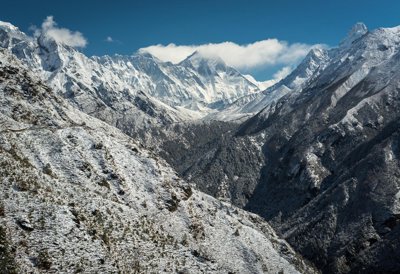Tom Heap discovers how to catch the planet's polluters with help from satellites, artificial intelligence and former US Vice President Al Gore, while Dr Tamsin Edwards of King's College London discusses the benefits of this solution.
What our experts say
We asked Society Fellows Professor Paul Palmer from the University of Edinburgh and Professor Raphael Heffron from the University of Dundee to offer some observations on the potential of reducing carbon emissions by pinpointing undeclared or under-estimated sources of greenhouse gases using new technology, and then applying global political and economic pressure to the offending companies or states. Their points take some of the themes of the programme a step further.
What are the limiting factors?
 Professor Paul Palmer
Professor Paul Palmer
Uncertainty bounds of any estimates being reported will need to be clearly stated and explained. If these estimates are too large it will be difficult to determine whether any sector/company/emitter is reducing their emissions in line with national and global pledges.
What are the co-benefits?
 Professor Paul Palmer
Professor Paul Palmer
-
Combustion emissions of greenhouse gases will likely be accompanied by a range of air pollutants that at elevated levels will be linked with human illnesses and reductions in agricultural crop yields. So, reducing GHG emissions will lead to better air quality.
-
Undeclared = amounts and locations? Locations are relatively easy but quantifying the magnitude of emission is more difficult. Identifying and quantifying diffuse sources (i.e., leaks) is also difficult but where money could be made (more money for companies, cheaper prices for customers). However, this is also where less effort is being made.
-
Reduced emissions of chlorofluorocarbons (CFCs) will help recovery of the stratospheric ozone layer.
-
Ideally, we want to reduce emissions, irrespective of whether they are declared or not.
 Professor Raphael Heffron
Professor Raphael Heffron
-
Ensuring the polluter-pays-principle is happening in practice.
-
It demonstrates that fossil fuels are more expensive than societies think. In particular, it will challenge the assumption that fossil fuels are cheaper than building low-carbon energy sources.
-
As above, but specifically there should be a reassessment of the cost of energy sources if undeclared pollution sources were factored in.
-
A societal transition to a low-carbon economy will happen faster if polluters pay, as this will ensure a transfer of finance to cleaner technology.
Are there any potential negative impacts of this idea?
 Professor Paul Palmer
Professor Paul Palmer
-
In the case of some CFCs that were until recently used to help insulate houses in China, the rapid reduction may lead to poorer or less widely adopted insulation. Will this drive a black market in GHG emissions?
-
Most current satellites pass over once per day and require sunlight. Can companies learn how to cheat the system? Perhaps avoid emitting during certain hours of the day?
-
There may be greater investment in badly thought-out carbon offsetting schemes that are not well policed? Who regulates the carbon offsetting sector?
 Professor Raphael Heffron
Professor Raphael Heffron
-
Who is collecting the data? How and where is it going? Not sufficient practices in consistent data collection or classification.
-
Collection of data is usually achieved by some regulatory authority. Capacity needs to be built up in these authorities but may be difficult to do as in some countries it may not be a supported activity.
-
Another problem to overcome is that data used differs from country to country. I.e., in environmental impact assessments, when new energy projects are built, or in a legal court room as evidence when a project is challenged.
Further reading
-
European Geosciences Union. 2017. A multi-model approach to monitor emissions of CO2 and CO from an urban–industrial complex. Atmospheric Chemistry and Physics
-
European Geosciences Union. 2020. Optimizing a dynamic fossil fuel CO2 emission model with CTDAS (CarbonTracker Data Assimilation Shell, v1.0) for an urban area using atmospheric observations of CO2, CO, NOx, and SO2. Geoscientific Model Development
-
European Geosciences Union. 2021. Automated detection of atmospheric NO2 plumes from satellite data: a tool to help infer anthropogenic combustion emissions. Atmospheric Measurement Techniques
-
Heffron, R. 2021. Energy multinationals challenged by the growth of human rights. Nature Energy, 6, pp. 849 - 851
-
Palmer, P . et al. 2003. Eastern Asian emissions of anthropogenic halocarbons deduced from aircraft concentration data. Journal of Geophysical Research, Atmospheres, 108
-
Rigby, M., et al. 2019. Increase in CFC-11 emissions from eastern China based on atmospheric observations. Nature, 596, pp. 546-550
-
The Production Gap. 2020. The Production Gap 2020 Report
-
UK Atmosphere. Satellites reveal anthropogenic combustion hotspots across the globe
-
Welsby, D. Price, J., Pye, S. and Ekins, P. 2021. Unextractable fossil fuels in a 1.5°C world. Nature, 597, 230-234
About the series
39 Ways to Save the Planet is a new radio series by BBC Radio 4 developed in partnership with the Society and broadcast in 2021. It showcases 39 ideas to relieve the stress that climate change is placing on the Earth. In each 15 minute episode Tom Heap and Dr Tamsin Edwards meet the people behind a fresh and fascinating idea to cut the carbon.
Over the course of 2021, the Society will be producing events and digital content to accompany the series.
Episode 38: Hunting down polluters

Featured card image: Transition Zero
Featured banner image: DmytroKo/Adobe Stock
In the future, will we need to rethink the term human-driven emissions? As the anthropogenic contribution to climate continues to grow, we will need to reassign wildfires as a massive source of human-driven emissions of climate. Fires we have seen over the past few years have been enormous pulses of a range of greenhouse gases and air pollutants.
